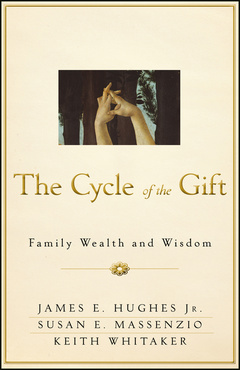The Cycle of the Gift Family Wealth and Wisdom Bloomberg Series, Vol. 168
Auteurs : Hughes James E., Massenzio Susan E., Whitaker Keith

James E. Hughes Jr., Esq., is a resident of Aspen, Colorado, and a retired attorney. Jay is the author of Family Wealth: Keeping It in the Family, and of Family–The Compact Among Generations, and numerous articles on family governance and wealth preservation as well as a series of "Reflections" which can be found on the Articles section of his website jamesehughes.com. He was the founder of a law partnership in New York City and has spoken frequently at numerous international and domestic symposia. He is a member of various philanthropic boards and a member of the editorial boards of various professional journals.
Dr. Susan E. Massenzio is a psychologist and founding Associate of Wise Counsel Research Associates, a think-tank and consultancy. Susan has extensive experience consulting to senior executives, leadership teams of Fortune 500 companies, and heads of family businesses. Susan served for many years as the senior psychologist for John Hancock Financial Services, a senior vice president at Wells Fargo Family Wealth, and professor and program director at Northeastern University. Susan is a member of the Collaboration for Family Flourishing.
Dr. Keith Whitaker is an educator and founding Associate with Wise Counsel Research Associates, a think-tank and consultancy. Keith has many years' experience consulting with advisors to and leaders of enterprising families. Keith served as a managing director at Wells Fargo Family Wealth, where he founded the innovative Family Dynamics Practice. He has also served as a researcher at the Center on Wealth and Philanthropy, a private trustee, a director of a private foundation, and a philosophy professor at Boston College.
Date de parution : 11-2012
Ouvrage de 192 p.
14x21.3 cm
Disponible chez l'éditeur (délai d'approvisionnement : 12 jours).
Prix indicatif 43,58 €
Ajouter au panierThème de The Cycle of the Gift :
Mots-clés :
family wealth, inheritance, estate taxes, cycle of the gift, estate planning, how to pass on wealth, how to manage inheritance, family office, managing family wealth, how to manage family wealth, how to pass on family fortunes, james hughes, james e, hughes, family wealth management, wealth management, spirit and money, gift as spirit, familys' spiritual capital, wisdom for giving, avoiding remittance addicted children, avoiding creating dependence, avoiding enabling dependence, how much is enou


